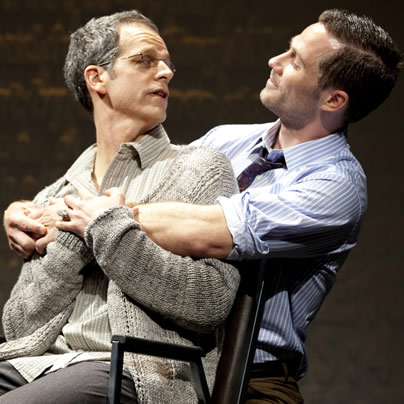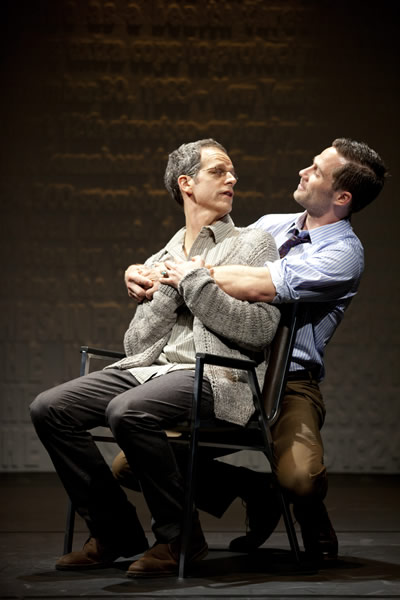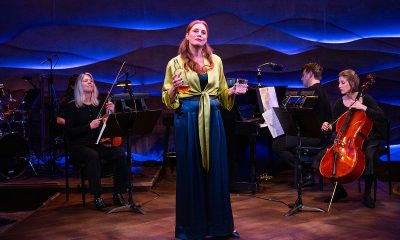Arts & Entertainment
‘Heart’ of the matter
Gay-penned classic gets first-ever D.C.-area production


Patrick Breen, left, as Ned and Luke MacFarlane as Felix in ‘The Normal Heart’ at Arena Stage. (Photo by Scott Suchman; courtesy Arena )
‘The Normal Heart’
Through July 29
Arena Stage
1101 6th Street, SW
$40-$94
202-488-3300
arenastage.org
Larry Kramer’s “The Normal Heart,” is aging well, breathtakingly so. This was proved last year on Broadway and it’s being demonstrated again with a powerfully searing production now playing at Arena Stage.
When Kramer’s biographical take on the early days of the AIDS crisis premiered in New York in 1985, gay men were dying in large numbers and then-President Reagan had yet to utter the word “AIDS” publicly, so not surprisingly the gay playwright’s words reportedly rang angry and alarmed. Today, Arena’s stripped-down and fast-paced revival helmed by gay director George C. Wolfe (who co-staged the Tony-winning Broadway version) still conveys the fury and fear while embracing the empathy and sadness also found in Kramer’s stunning play.
Kramer’s script wastes no time in establishing the horror of the situation. Seated in their doctor’s waiting room (circa 1981 Manhattan), several gay men tensely discuss the still nameless plague that is making them ill and killing their friends. They talk early symptoms (swollen glands, night sweats, fatigue), treatment (almost nothing) and chances of survival (slim). As one patient exits the office revealing a youthful face jarringly marred by Kaposi sarcoma lesions, another enters collapsing from the effects of a violent seizure. The plague is on and it’s going to get worse.
The action focuses on irascible but likeable writer/activist Ned Weeks, a Kramer stand-in superbly played with nuance and great heart by Patrick Been. After several informational meetings and an examination with Dr. Brookner (Patricia Wettig), a prickly physician whose patients include many of the epidemics’ first victims, Ned is convinced that gay men will need to save themselves. He suspects the disease is sexually transmitted.
Determined to rally gays to action, Ned creates an advocacy group similar to Gay Men’s Health Crisis (co-founded by Kramer), and manages to grow the organization despite a lack of support from closeted New York City Mayor Ed Koch and a largely apathetic gay community. Eventually, Ned’s co-members, wrongly but understandably, reject his increasingly angry style as well as his promotion of total abstinence (the concept of safe sex would come later). “We just feel that you can’t tell people how to live,” says Bruce (Nick Mennell), one of the organization’s more popular members. Ned is forced out.
More than a tirade, “The Normal Heart” is also an absorbing family drama. Ned has the love and support of his hotshot lawyer brother played by John Procaccino, but yearns for his total acceptance. It’s also a medical mystery and quite strikingly, a sweet love story. While the plague rages, Ned unexpectedly finds love with Felix, a New York Times style writer beautifully played by handsome gay actor Luke Macfarlane. He’s Ned’s first serious lover.
In the second act when Felix is diagnosed with the deadly virus, he warns Ned that things will become messy, and indeed they do. Messy and heartbreaking, as evidenced by the ongoing sniffles and stifled sobs heard throughout Arena’s Kreeger Theatre.
Plague weary, the central characters finally crack in a series of emotionally raw monologues. Beleaguered activist Mickey (subtly played by Michael Berresse) considers suicide; the typically reserved Dr. Brookner rails against the smug government doctor who refuses her application for a grant; conservative Bruce, a bank V.P. and former Green Beret, dissolves to tears explaining his late lover’s humiliating death; and Ned fiercely expresses his disappointment with the gay community’s inadequate early response to the epidemic.
David Rockwell’s stark set is quietly monumental: White walls embossed with AIDS-related words and phrases (also white) which — depending on the David Weiner’s smart lighting — can or cannot be seen in relief. Also, various locale descriptions and, most affectively, the names of actual AIDS victims are projected on to the set. As the play progresses, these projected names grow exponentially.
The terrific cast also includes Christopher J. Hanke as Tommy Boatwright, a saucy but caring southerner; Jon Levenson as the mayor’s imperious aide de camp; local actor Chris Dinolfo is the young patient with K.S; and Tom Berklund plays Grady, a dim but well-built volunteer.
For Kramer, who learned he was HIV-positive in 1988, “The Normal Heart” might simply serve as proof that he was right all along, but that’s antithetical to his fighting spirit. At Arena, leaflets penned by Kramer decrying the un-won global war on AIDS are distributed to audience members as they leave. The battle continues.

Team DC, the umbrella organization for LGBTQ-friendly sports teams and leagues in the D.C. area, held its annual Night of Champions Awards Gala on Saturday, April 20 at the Hilton National Mall. The organization gave out scholarships to area LGBTQ student athletes as well as awards to the Different Drummers, Kelly Laczko of Duplex Diner, Stacy Smith of the Edmund Burke School, Bryan Frank of Triout, JC Adams of DCG Basketball and the DC Gay Flag Football League.
(Washington Blade photos by Michael Key)




















The 2024 National Cannabis Festival was held at the Fields at RFK Stadium on April 19-20.
(Washington Blade photos by Michael Key)
















Covering the @NatlCannaFest at RFK Stadium for @WashBlade . Stop by the LGBTQ+ booth and pick up a paper if you are here. pic.twitter.com/is7hnsaPns
— Michael Patrick Key (@MichaelKeyWB) April 20, 2024
Theater
‘Amm(i)gone’ explores family, queerness, and faith
A ‘fully autobiographical’ work from out artist Adil Mansoor

‘Amm(i)gone’
Thorough May 12
Woolly Mammoth Theatre
641 D St., N.W.
$60-$70
Woollymammoth.net
“Fully and utterly autobiographical.” That’s how Adil Mansoor describes “Amm(i)gone,” his one-man work currently playing at Woolly Mammoth Theatre.
Both created and performed by out artist Mansoor, it’s his story about inviting his Pakistani mother to translate Sophocles’s Greek tragedy “Antigone” into Urdu. Throughout the journey, there’s an exploration of family, queerness, and faith,as well as references to teachings from the Quran, and audio conversations with his Muslim mother.
Mansoor, 38, grew up in the suburbs of Chicago and is now based in Pittsburgh where he’s a busy theater maker. He’s also the founding member of Pittsburgh’s Hatch Arts Collective and the former artistic director of Dreams of Hope, an LGBTQ youth arts organization.
WASHINGTON BLADE: What spurred you to create “Amm(i)gone”?
ADIL MANSOOR: I was reading a translation of “Antigone” a few years back and found myself emotionally overwhelmed. A Theban princess buries her brother knowing it will cost her, her own life. It’s about a person for whom all aspirations are in the afterlife. And what does that do to the living when all of your hopes and dreams have to be reserved for the afterlife?
I found grant funding to pay my mom to do the translation. I wanted to engage in learning. I wanted to share theater but especially this ancient tragedy. My mother appreciated the characters were struggling between loving one another and their beliefs.
BLADE: Are you more director than actor?
MANSOOR: I’m primarily a director with an MFA in directing from Carnegie Mellon. I wrote, directed, and performed in this show, and had been working on it for four years. I’ve done different versions including Zoom. Woolly’s is a new production with the same team who’ve been involved since the beginning.
I love solo performance. I’ve produced and now teach solo performance and believe in its power. And I definitely lean toward “performance” and I haven’t “acted” since I was in college. I feel good on stage. I was a tour guide and do a lot of public speaking. I enjoy the attention.
BLADE: Describe your mom.
MANSOOR: My mom is a wonderfully devout Muslim, single mother, social worker who discovered my queerness on Google. And she prays for me.
She and I are similar, the way we look at things, the way we laugh. But different too. And those are among the questions I ask in this show. Our relationship is both beautiful and complicated.
BLADE: So, you weren’t exactly hiding your sexuality?
MANSOOR: In my mid-20s, I took time to talk with friends about our being queer with relation to our careers. My sexuality is essential to the work. As the artistic director at Dreams of Hope, part of the work was to model what it means to be public. If I’m in a room with queer and trans teenagers, part of what I’m doing is modeling queer adulthood. The way they see me in the world is part of what I’m putting out there. And I want that to be expansive and full.
So much of my work involves fundraising and being a face in schools. Being out is about making safe space for queer young folks.
BLADE: Have you encountered much Islamophobia?
MANSOOR: When 9/11 happened, I was a sophomore in high school, so yes. I faced a lot then and now. I’ve been egged on the street in the last four months. I see it in the classroom. It shows up in all sorts of ways.
BLADE: What prompted you to lead your creative life in Pittsburgh?
MANSOOR: I’ve been here for 14 years. I breathe with ease in Pittsburgh. The hills and the valleys and the rust of the city do something to me. It’s beautiful, it’ affordable, and there is support for local artists. There’s a lot of opportunity.
Still, the plan was to move to New York in September of 2020 but that was cancelled. Then the pandemic showed me that I could live in Pittsburgh and still have a nationally viable career.
BLADE: What are you trying to achieve with “Amm(i)gone”?
MANSOOR: What I’m sharing in the show is so very specific but I hear people from other backgrounds say I totally see my mom in that. My partner is Catholic and we share so much in relation to this.
I hope the work is embracing the fullness of queerness and how means so many things. And I hope the show makes audiences want to call their parents or squeeze their partners.
-

 District of Columbia5 days ago
District of Columbia5 days agoNew D.C. LGBTQ+ bar Crush set to open April 19
-

 District of Columbia5 days ago
District of Columbia5 days agoReenactment of first gay rights picket at White House draws interest of tourists
-

 Arizona5 days ago
Arizona5 days agoAriz. governor vetoes anti-transgender, Ten Commandments bill
-

 South America3 days ago
South America3 days agoDaniel Zamudio murderer’s parole request denied












